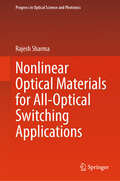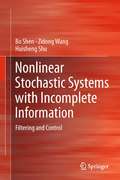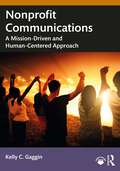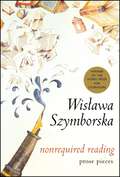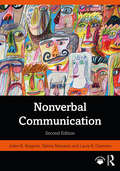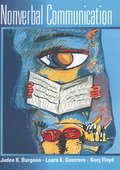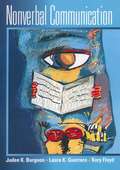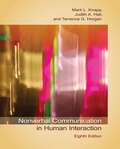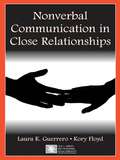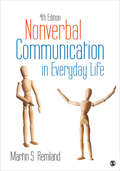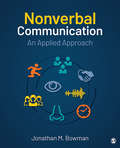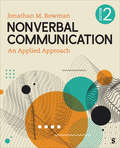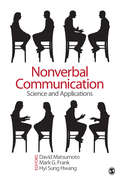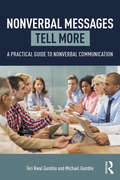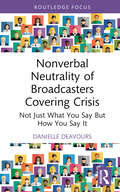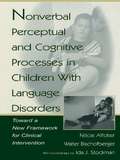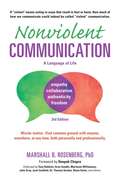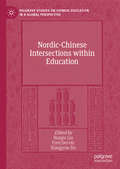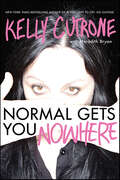- Table View
- List View
Nonlinear Optical Materials for All-Optical Switching Applications (Progress in Optical Science and Photonics #33)
by Rajesh SharmaThis book highlights the background and fundamentals of nonlinear optical materials in relation to all-optical switching applications. It explains major aspects of nonlinear refractive index and the nonlinear absorption phenomena which are essential to decide the figure-of-merit of various materials for the all-optical switching. Autocorrelation technique, frequency-resolved optical gating, spectral phase interferometry for direct electric-field reconstruction, grating-eliminated no-nonsense observation of ultrafast incident laser light e-fields are discussed to measure the temporal and spectral profiles of the ultrafast pulsed lasers. Advanced nonlinear optical characterization methods such as single- and dual-arm Z-scan, pump-probe and beam deflection techniques are also discussed at length. The transmission signal obtained in the majority of the nonlinear optical effects is found to be weak which creates hiccups to obtain faster switching speeds. Various solutions are discussed to overcome these existing limitations of the all-optical switching-based devices. Optical nonlinearities in semiconductors, organic molecules and challenges in all-optical switching devices are also addressed in the book.
Nonlinear Power Flow Control Design
by Rush D. Robinett III David G. WilsonThis book presents an innovative control system design process motivated by renewable energy electric grid integration problems. The concepts developed result from the convergence of research and development goals which have important concepts in common: exergy flow, limit cycles, and balance between competing power flows. A unique set of criteria is proposed to design controllers for a class of nonlinear systems. A combination of thermodynamics with Hamiltonian systems provides the theoretical foundation which is then realized in a series of connected case studies. It allows the process of control design to be viewed as a power flow control problem, balancing the power flowing into a system against that being dissipated within it and dependent on the power being stored in it - an interplay between kinetic and potential energies. Human factors and the sustainability of self-organizing systems are dealt with as advanced topics.
Nonlinear Stochastic Systems with Incomplete Information
by Huisheng Shu Zidong Wang Bo ShenNonlinear Stochastic Processes addresses the frequently-encountered problem of incomplete information. The causes of this problem considered here include: missing measurements; sensor delays and saturation; quantization effects; and signal sampling. Divided into three parts, the text begins with a focus on H filtering and control problems associated with general classes of nonlinear stochastic discrete-time systems. Filtering problems are considered in the second part, and in the third the theory and techniques previously developed are applied to the solution of issues arising in complex networks with the design of sampled-data-based controllers and filters. Among its highlights, the text provides: * a unified framework for filtering and control problems in complex communication networks with limited bandwidth; * new concepts such as random sensor and signal saturations for more realistic modeling; and * demonstration of the use of techniques such as the Hamilton-Jacobi-Isaacs, difference linear matrix, and parameter-dependent matrix inequalities and sums of squares to handle the computational challenges inherent in these systems. The collection of recent research results presented in Nonlinear Stochastic Processes will be of interest to academic researchers in control and signal processing. Graduate students working with communication networks with lossy information and control of stochastic systems will also benefit from reading the book.
Nonprofit Communications: A Mission-Driven and Human-Centered Approach
by Kelly C. GagginThis text provides a guide to strategic communications for nonprofit organizations that is rooted in the desire to serve and do good.Acknowledging that nonprofit organizations, like commercial businesses, cannot succeed without a communications strategy that supports their overall business goals, seasoned practitioner and educator Kelly C. Gaggin explores the industry in a way that nurtures the servant’s heart while clearly discussing the business structure of nonprofits and the need (in most cases) to earn revenue to provide services. She teaches a strategic and integrated approach to communications that is mission-based and human-centric to align the values of the nonprofit sector with the campaign planning process. This text offers a view of nonprofits at local, national, and international levels of impact and explores those relationships while keeping in mind the value and needs of those being served.This book is an indispensable text for undergraduate and graduate courses in nonprofit strategic communications and/or management as well as an essential resource for nonprofit industry professionals.Online resources also accompany this text. For instructors: lecture slides, syllabus, chapter quizzes. For students: planning templates for DEEEM model. Please visit www.routledge.com/9781032461144.
Nonrequired Reading
by Wislawa Szymborska Clare CavanaghWislawa Szymborska's poems are admired around the world, and her unsparing vision, tireless wit, and deep sense of humanity are cherished by countless readers. Unknown to most of them, however, Szymborska also worked for several decades as a columnist, reviewing a wide variety of books under the unassuming title "Nonrequired Reading." As readers of her poems would expect, the short prose pieces collected here are anything but ordinary. Reflecting the author's own eclectic tastes and interests, the pretexts for these ruminations range from books on wallpapering, cooking, gardening, and yoga, to more lofty volumes on opera and world literature. Unpretentious yet incisive, these charming pieces are on a par with Szymborska's finest lyrics, tackling the same large and small questions with a wonderful curiosity.
Nonverbal Communication
by Laura K. Guerrero Judee K Burgoon Valerie ManusovThe newly revised edition of this groundbreaking textbook provides a comprehensive overview of the theory, research, and applications of nonverbal communication. Authored by three of the foremost scholars in the field and drawing on multidisciplinary research from communication studies, psychology, linguistics, and family studies, Nonverbal Communication speaks to today’s students with modern examples that illustrate nonverbal communication in their lived experiences. It emphasizes nonverbal codes as well as the functions they perform to help students see how nonverbal cues work with one another and with the verbal system through which we create and understand messages and shows how consequential nonverbal means of communicating are in people’s lives. Chapters cover the social and biological foundations of nonverbal communication as well as the expression of emotions, interpersonal conversation, deception, power, and influence. This edition includes new content on “Influencing Others,” as well as a revised chapter on “Displaying Identities, Managing Images, and Forming Impressions” that combines identity, impression management, and person perception. Nonverbal Communication serves as a core textbook for undergraduate and graduate courses in communication and psychology. Online resources for instructors, including an extensive instructor’s manual with sample exercises and a test bank, are available at www.routledge.com/9780367557386
Nonverbal Communication
by Laura K. Guerrero Kory Floyd Judee K BurgoonDrawing significantly on both classic and contemporary research, Nonverbal Communication speaks to today’s students with modern examples that illustrate nonverbal communication in their lived experiences. This new edition, authored by three of the foremost scholars in nonverbal communication, builds on the approach pioneered by Burgoon, Buller and Woodall which focused on both the features and the functions that comprise the nonverbal signaling system. Grounded in the latest multidisciplinary research and theory, Nonverbal Communication strives to remain very practical, providing both information and application to aid in comprehension.
Nonverbal Communication
by Laura K. Guerrero Kory Floyd Judee K. BurgoonThis new edition, authored by three of the foremost scholars in nonverbal communication, builds on the approach pioneered by Burgoon, Buller and Woodall which focused on both the features and the functions that comprise the nonverbal signaling system. Grounded in the latest multidisciplinary research and theory, Nonverbal Communication strives to remain very practical, providing both information and application to aid in comprehension.
Nonverbal Communication In Human Interaction
by Mark L. Knapp Judith A. Hall Terrence G. HorganNONVERBAL COMMUNICATION IN HUMAN INTERACTION is the most comprehensive and readable compendium of research and theory on nonverbal communication available today. Written by a communication scholar and two social psychologists, the book offers an interdisciplinary approach to the study of nonverbal communication that shows how it affects a wide variety of academic interests. The theory and research included in this text comes from scholars with a wide variety of academic backgrounds, including communication, anthropology, counseling, psychology, psychiatry, and linguistics. The eighth edition includes new material on nonverbal messages and technology/media that covers the increasing amount of communication that is mediated by some form of technology and newly added text boxes that acquaint readers with cutting-edge research questions and findings, and appeal to your real-life concerns.
Nonverbal Communication in Close Relationships
by Laura K. Guerrero Kory FloydNonverbal Communication in Close Relationships provides a synthesis of research on nonverbal communication as it applies to interpersonal interaction, focusing on the close relationships of friends, family, and romantic partners. Authors Laura K. Guerrero and Kory Floyd support the premise that nonverbal communication is a product of biology, social learning, and relational context. They overview six prominent nonverbal theories and show how each is related to bio-evolutionary or sociocultural perspectives. Their work focuses on various functions of nonverbal communication, emphasizing those that are most relevant to the initiation, maintenance, and dissolution of close relationships. Throughout the book, Guerrero and Floyd highlight areas where research is either contradictory or inconclusive, hoping that in the years to come scholars will have a clearer understanding of these issues. The volume concludes with a discussion of practical implications that emerge from the scholarly literature on nonverbal communication in relationships – an essential component for understanding relationships in the real world. Nonverbal Communication in Close Relationships makes an important contribution to the development of our understanding not only of relationship processes but also of the specific workings of nonverbal communication. It will serve as a springboard for asking new questions and advancing new theories about nonverbal communication. It is intended for scholars and advanced students in personal relationship study, social psychology, interpersonal communication, nonverbal communication, family studies, and family communication. It will also be a helpful resource for researchers, clinicians, and couples searching for a better understanding of the complicated roles that nonverbal cues play in relationships.
Nonverbal Communication in Everyday Life
by Martin S. RemlandNonverbal Communication in Everyday Life, Fourth Edition, is the most comprehensive, thoroughly researched, and up-to-date introduction to the subject of nonverbal communication available today. Renowned author Martin S. Remland introduces nonverbal communication in a concise and engaging format that connects foundational concepts, current theory, and new research findings to familiar everyday interactions. Presented in three parts, the text offers full and balanced coverage of the functions, channels, and applications of nonverbal communication. This approach not only gives students a strong foundation, but also allows them to fully appreciate the importance of nonverbal communication in their personal and professional lives.
Nonverbal Communication in Everyday Life
by Martin S. RemlandNonverbal Communication in Everyday Life, Fourth Edition, is the most comprehensive, thoroughly researched, and up-to-date introduction to the subject of nonverbal communication available today. Renowned author Martin S. Remland introduces nonverbal communication in a concise and engaging format that connects foundational concepts, current theory, and new research findings to familiar everyday interactions. Presented in three parts, the text offers full and balanced coverage of the functions, channels, and applications of nonverbal communication. This approach not only gives students a strong foundation, but also allows them to fully appreciate the importance of nonverbal communication in their personal and professional lives.
Nonverbal Communication: An Applied Approach
by Dr. Jonathan Michael BowmanNonverbal Communication: An Applied Approach teaches students the fundamentals of nonverbal communication by making connections between the principles they learn and the everyday communication they perform and interpret. Award-winning teacher and author Jonathan M. Bowman uses a narrative style and an applied approach that is informed by the important theories and research-driven knowledge of this interdisciplinary area of study. The approach encourages students to understand the relevancy of nonverbal codes by exploring applications sooner rather than in the latter half of their course. Bowman brings in a unique focus on culture and social justice, demonstrating how nonverbal communication shapes how we interact in a diverse society.
Nonverbal Communication: An Applied Approach
by Dr. Jonathan Michael BowmanNonverbal Communication: An Applied Approach teaches students the fundamentals of nonverbal communication by making connections between the principles they learn and the everyday communication they perform and interpret. Award-winning teacher and author Jonathan M. Bowman uses a narrative style and an applied approach that is informed by the important theories and research-driven knowledge of this interdisciplinary area of study. The approach encourages students to understand the relevancy of nonverbal codes by exploring applications sooner rather than in the latter half of their course. Bowman brings in a unique focus on culture and social justice, demonstrating how nonverbal communication shapes how we interact in a diverse society.
Nonverbal Communication: An Applied Approach
by Jonathan Michael BowmanNonverbal Communication: An Applied Approach, Second Edition teaches students the fundamentals of nonverbal communication in a way that helps them see the connections between the principles they learn and the everyday communication they perform and interpret. Nonverbal Communication: An Applied Approach has taken a narrative style and applied approach that is informed by the important theories and research-driven knowledge of this interdisciplinary area of study. This approach encourages students to understand the relevancy of nonverbal codes right away, instead of waiting until the second half of the course to explore applications. Author Jonathan Bowman also brings in a unique focus on diversity and social justice, demonstrating how nonverbal communication shapes and molds how we interact in a diverse society. The Second Edition includes updated examples, a new Upgrade feature box examining the impact of digital experiences across the course of the lifespan, and updated key terms, guiding and closing questions, citations, photos, and figures.
Nonverbal Communication: An Applied Approach
by Jonathan Michael BowmanNonverbal Communication: An Applied Approach, Second Edition teaches students the fundamentals of nonverbal communication in a way that helps them see the connections between the principles they learn and the everyday communication they perform and interpret. Nonverbal Communication: An Applied Approach has taken a narrative style and applied approach that is informed by the important theories and research-driven knowledge of this interdisciplinary area of study. This approach encourages students to understand the relevancy of nonverbal codes right away, instead of waiting until the second half of the course to explore applications. Author Jonathan Bowman also brings in a unique focus on diversity and social justice, demonstrating how nonverbal communication shapes and molds how we interact in a diverse society. The Second Edition includes updated examples, a new Upgrade feature box examining the impact of digital experiences across the course of the lifespan, and updated key terms, guiding and closing questions, citations, photos, and figures.
Nonverbal Communication: Science and Applications
by David Matsumoto Dr Mark G. Frank Hyi Sung HwangEdited by three leading authorities on nonverbal behavior, this book examines state-of-the-art research and knowledge regarding nonverbal behavior and applies that scientific knowledge to a broad range of fields. The editors present a true scientist-practitioner model, blending cutting-edge behavioral science with real-world practical experience—the first of its kind to merge theoretical and practical worlds. The observations of the practitioners who share their insights and experience will inspire and generate many new research ideas. This book is a valuable resource for students, practitioners and professionals to discover the science behind the practice and to see how other professionals have incorporated nonverbal communication into practice.
Nonverbal Messages Tell More: A Practical Guide to Nonverbal Communication
by Michael Gamble Teri Kwal GambleNonverbal Messages Tell More: A Practical Guide to Nonverbal Communication offers an active and dynamic approach to the study of nonverbal communication. The study of nonverbal cues and messages is a difficult undertaking, but Teri and Michael Gamble have put together a volume that approaches the field from a variety of perspectives. Nonverbal Messages Tell More bridges the relevance gap by making the text more accessible and interesting to students of all levels. It does so by highlighting examples of nonverbal behavior taken from popular culture including film, television, and broadcast and print news. This volume provides a thorough overview of the classic and contemporary research and theory for nonverbal communication. It contains a number of features, including experiential guidelines and activities that give students better self-insight and understanding of the nonverbal messages other individuals display. At the end of every chapter are a series of follow-up investigations designed to demonstrate mastery of the content and the ability to apply what was just learned. Nonverbal Messages Tell More also presents the necessary know-how for presenting oneself using nonverbal cues that encourage others to perceive you as personable and credible. It leaps ahead of other books on the subject by offering students an engaging, practical, and useful introduction to the study of nonverbal communication.
Nonverbal Neutrality of Broadcasters Covering Crisis: Not Just What You Say But How You Say It (Routledge Focus on Journalism Studies)
by Danielle F DeavoursOffering a critical and sensitive reflection on journalists’ nonverbal behaviors during their coverage of school shootings in the U.S., this book shows how individual- and social-level factors predict broadcasters’ nonverbal neutrality. Nonverbal behaviors have the ability to transmit bias, influence audiences, and impact perceptions of journalists. Yet journalists report receiving little to no training on nonverbal communication, despite often being placed in emotional, chaotic situations that affect their ability to remain neutral during coverage. This book provides theoretical and methodological contributions, as well as applicable advice, to assist researchers’, instructors’, and journalists’ understandings of ongoing boundary negotiations of this rarely discussed but highly impactful aspect of objectivity. Through the proposal of the Nonverbal Neutrality Theory, it outlines predictive patterns and routines that contribute to the variability of nonverbal neutrality, and equips readers, including industry professionals and journalism educators, with examples of best practice to help better plan for crisis coverage. The work draws on journalists’ reflections on professional norms and conceptualizations of nonverbal neutrality, vicarious traumatization, and social- and organizational-level influences. As one of the first to explore nonverbal neutrality, its predictive factors, and patterns across crisis events, this book provides a much-needed insight into the nonverbal behaviors of broadcast journalists at a time when the media relies ever more on visual delivery on television, digital, and social media networks.
Nonverbal Perceptual and Cognitive Processes in Children With Language Disorders: Toward A New Framework for Clinical intervention
by Walter Bischofberger F‚licie AffolterA growing body of literature is suggesting that many children with language disorders and delays--even those with so-called specific language impairment--have difficulties in other domains as well. In this pathbreaking book, the authors draw on more than 40 years of research and clinical observations of populations ranging from various groups of children to adults with brain damage to construct a comprehensive model for the development of the interrelated skills involved in language performance, and trace the crucial implications of this model for intervention. Early tactual feedback, they argue, is more critical for the perceptual/cognitive organization of experiences that constitutes a foundation for language development than either visual or auditory input, and the importance of tactually-anchored nonverbal interaction cannot be ignored if efforts at treatment are to be successful. All those professionally involved in work with children and adults with language problems will find the authors' model provocative and useful.
Nonviolent Communication: A Language of Life
by Marshall B. Rosenberg Arun GandhiDo you hunger for skills to improve the quality of your relationships, to deepen your sense of personal empowerment or to simply communicate more effectively? Unfortunately, for centuries our culture has taught us to think and speak in ways that can actually perpetuate conflict, internal pain and even violence. Nonviolent Communication partners practical skills with a powerful consciousness and vocabulary to help you get what you want peacefully. <P><P>In this internationally acclaimed text, Marshall Rosenberg offers insightful stories, anecdotes, practical exercises and role-plays that will dramatically change your approach to communication for the better. Discover how the language you use can strengthen your relationships, build trust, prevent conflicts and heal pain. Revolutionary, yet simple, NVC offers you the most effective tools to reduce violence and create peace in your life--one interaction at a time.
Nonviolent Communication: A Language of Life
by Marshall B. RosenbergAn enlightening look at how peaceful communication can create compassionate connections with family, friends, and other acquaintances. The book uses stories, examples, and sample dialogues to provide solutions to communication problems both at home and in the workplace. Guidance is provided on identifying and articulating feelings and needs, expressing anger fully, and exploring the power of empathy in order to speak honestly without creating hostility, break patterns of thinking that lead to anger and depression, and communicate compassionately. These non-violent communication skills are fully explained and can be applied to personal, professional, and political differences. Included in this new edition is information on how to compassionately connect with oneself.
Nonviolent Communication™: A Language of Life
by Marshall B. RosenbergNonviolent Communication skills are partnered with a powerful Consciousness, Language, Communication and Means of influence. Nonviolent Communication serves our desire by Increase our ability to live with choice, meaning, and connection. Connect empathically with self and others to have more satisfying relationships. Sharing of resources so everyone is able to benefit.
Nordic-Chinese Intersections within Education (Palgrave Studies on Chinese Education in a Global Perspective)
by Fred Dervin Xiangyun Du Haiqin LiuThis book examines how the two educational systems of China and the Nordic countries intersect. Over the past decade, there has been increased growth and interaction between China and the Nordic countries due to both government encouragement and academic curiosity. This book rejects a simplistic approach that presents both spaces as culturally uniform, confronting ‘East’ and ‘West’ entities, and suggests a comparative and contrastive approach that is critical and reflexive in both theory and methodology. This does not solely concentrate on difference, but emphasises similarities, including studies on philosophical, conceptual and methodological issues. This nuanced edited collection will appeal to students and scholars of Nordic and Chinese education as well as globalisation and interculturality.
Normal Gets You Nowhere
by Meredith Bryan Kelly Cutronenor-mal: 2a: according with, constituting, ornot deviating from a norm, rule or principle b: conforming to a type, standard, or regular pattern 4 a: of, relating to, or characterized by average intelligence or development Uh, who wants that?Hot on the heels of her New York Times bestseller IfYou Have to Cry, Go Outside, Kelly Cutrone isback with another no-holds-barred book to awaken our souls and kick our assesinto gear. In Normal Gets You Nowhere, she invites us to get our freakon. History is full of successful, world-changing people who did not fitin. Think Nelson Mendela, Joan of Arc, EleanorRoosevelt, John Lennon. Instead of changing themselves to accommodate thestatus quo or what others thought they should be, these people hung a light ontheir differences – and changed humanity in the process. There’s already anarmy of supertalented uberfreakschanging the world–isn’t it time you joined them?
